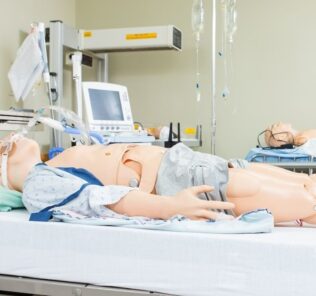Research Update: Clinical Simulation in Nursing | March 2023
The field of healthcare simulation has made tremendous strides forward over the past several decades. One way this revolution is made possible is through clinical simulation research being conducted across the globe. The journal Clinical Simulation in Nursing is constantly sharing updates that include article reviews, more information on standards of best practice, research briefs, and overall innovations in medical simulation. This HealthySimulation.com article provides an overview of the latest clinical simulation highlights as of March 2023 and explains how these updates impact the healthcare simulation community overall.
Competency-based Evaluations in Undergraduate Nursing Simulation: A State of the Literature
This clinical simulation research article discusses how variances in evaluations and tools used to assess entry-level nursing competence create inconsistencies within simulation-based learning. This research study specifically aimed to determine the current evidence related to competency-based evaluation methods used for undergraduate nursing simulation. To do so, the principal investigator searched the literature on competency-based evaluations used with undergraduate nursing learners in the simulation setting. In the end, three recurring factors were discovered related to using competency-based evaluations in undergraduate nursing simulation: theoretical foundations, objective faculty outcome measurements, and tool development. Several gaps in the literature are also discussed.
Sponsored Content:
This clinical simulation research shares how robust evidence now supports the effectiveness of simulation training in nursing and midwifery education. The study also discusses how simulation allows trainees to apply newly-learned skills in a supportive environment. Ultimately, this study was conducted using the Consolidated Framework for Implementation Research (CFIR). The authors conducted in-depth individual interviews with simulation experts around the world. Their findings highlight best practices in facilitating simulation implementation across resource settings.
Screen-Based Simulation as a Novel Recertification Tool for Certified Registered Nurse Anesthetists
This medical simulation research article shares how screen-based simulation (SBS) activities incorporated into the Continued Professional Certification (CPC) Program could target and improve the management of high-acuity, low-frequency events like intraoperative emergencies. The article explains how simulation modalities like SBS “offer greater distribution, accessibility, and scalability than in-person simulation and should be explored for potential inclusion in the CPC Program.” The research states that quality improvement projects and research on SBS are needed to guide the future use of SBS for recertifying CRNAs and the CPC Program. Overall, technological aptitude may impact usability yet SBS may be a viable adjunct to the CPC Program.
Sponsored Content:
This nursing simulation research article describes the development of a telephone triage SBE for undergraduate nursing students in a community-based course, including details on scenario design, curriculum integration, prebriefing, debriefing, and evaluation. According to the research, the SBE is designed to be delivered remotely without the use of high-fidelity simulators. The article also shares how the SBE uses Briggs Telephone Triage protocols, which allow learners to not only practice triage assessments but also clinical judgment within their scope of practice. Ultimately, the research highlights that learners gained experience and confidence in communicating, making clinical decisions, and providing evidence-based assessments for safe patient care.
This clinical simulation in nursing research article shares how anesthesia and critical care professionals “have been shown to be particularly affected by the problems of stress, anxiety, and burnout.” Yet, the authors explain that simulation training could be a sustainable solution to help healthcare workers to deal with this situation. However, there is reportedly poor scientific evidence on the short-term effect of simulation training on stress, anxiety, and burnout in anesthesia and critical care workers. As a result, this prospective observational study assessed anesthesia and critical care professionals participating in simulation training for critical situations for one year. Perceived Stress Score (PSS), State-Trait Anxiety Inventory (STAI), and Maslach Burnout Inventory (MBI) were collected before and 1 week after the training.
More About Clinical Simulation in Nursing
Clinical Simulation in Nursing is an international, peer-reviewed journal published online monthly. Clinical Simulation in Nursing is the official journal of the International Nursing Association for Clinical Simulation & Learning (INACSL) and reflects the organization’s mission to advance the science of healthcare simulation.
Articles are indexed in the Science Citation Index Expanded, Journal Citation Reports/Science Edition, Social Science Citation Index, Journal Citation Reports/Social Sciences Edition, and Current Contents/Social and Behavioral Health Sciences. INACSL reviews and accepts articles from other health provider disciplines, if they are determined to be of interest to the INACSL readership. The journal accepts manuscripts meeting one or more of the following criteria:
- Research articles and literature reviews (e.g. systematic, scoping, umbrella, integrative, etc.) about simulation
- Innovative teaching/learning strategies using simulation
- Articles updating guidelines, regulations, and legislative policies that impact simulation
- Leadership for simulation
- Simulation operations
- Clinical and academic uses of simulation
More About INACSL
The International Nursing Association for Clinical and Simulation Learning (INACSL) is an association dedicated to advancing the science of healthcare simulation. With over 1,800 members worldwide, the organization’s mission is to be the global leader in the art and science of healthcare simulation through excellence in nursing education, practice, and research.
INACSL’s goal is also to advance the science of nursing simulation by providing professional development, networking resources, and leadership in defining healthcare simulation standards of best practice. INACSL membership provides the education, resources, and tools that best address current challenges and help support learner, educator, and professional goals related to the learning of healthcare simulation’s latest developments. This is while ensuring that these individuals are enabled to provide the most comprehensive education and training for high-quality patient care.
Whether someone is new to healthcare simulation and is looking to understand the fundamentals or is experienced and seeking the latest updates and research, INACSL can provide them with the support they need. Membership in INACSL is based on connection, engagement, support, and inspiration.
Learn More About Clinical Simulation
Lance Baily, BA, EMT-B, is the Founder / CEO of HealthySimulation.com, which he started in 2010 while serving as the Director of the Nevada System of Higher Education’s Clinical Simulation Center of Las Vegas. Lance also founded SimGHOSTS.org, the world’s only non-profit organization dedicated to supporting professionals operating healthcare simulation technologies. His co-edited Book: “Comprehensive Healthcare Simulation: Operations, Technology, and Innovative Practice” is cited as a key source for professional certification in the industry. Lance’s background also includes serving as a Simulation Technology Specialist for the LA Community College District, EMS fire fighting, Hollywood movie production, rescue diving, and global travel. He and his wife live with their two brilliant daughters and one crazy dachshund in Las Vegas, Nevada.
Sponsored Content:


















